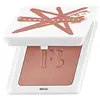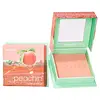What's inside
What's inside
 Key Ingredients
Key Ingredients

 Benefits
Benefits

 Concerns
Concerns

 Ingredients Side-by-side
Ingredients Side-by-side

Mica
Cosmetic ColorantDimethicone
EmollientTrimethylsiloxysilicate
EmollientSilica
AbrasiveDimethicone/Vinyl Dimethicone Crosspolymer
Skin ConditioningEthylhexyl Palmitate
EmollientEthylhexylglycerin
Skin ConditioningZinc Stearate
Cosmetic ColorantSynthetic Fluorphlogopite
Vinyl Dimethicone/Methicone Silsesquioxane Crosspolymer
Lauroyl Lysine
Skin ConditioningCaprylic/Capric Triglyceride
MaskingDehydroacetic Acid
PreservativeStearic Acid
CleansingMagnolia Officinalis Bark Extract
AntimicrobialTocopherol
AntioxidantCI 77891
Cosmetic ColorantIron Oxides
CI 15850
Cosmetic ColorantMica, Dimethicone, Trimethylsiloxysilicate, Silica, Dimethicone/Vinyl Dimethicone Crosspolymer, Ethylhexyl Palmitate, Ethylhexylglycerin, Zinc Stearate, Synthetic Fluorphlogopite, Vinyl Dimethicone/Methicone Silsesquioxane Crosspolymer, Lauroyl Lysine, Caprylic/Capric Triglyceride, Dehydroacetic Acid, Stearic Acid, Magnolia Officinalis Bark Extract, Tocopherol, CI 77891, Iron Oxides, CI 15850
Synthetic Fluorphlogopite
Mica
Cosmetic ColorantZinc Stearate
Cosmetic ColorantLauryl Dimethicone
Skin ConditioningPentaerythrityl Tetraisostearate
EmollientAlumina
AbrasiveVinyl Dimethicone/Methicone Silsesquioxane Crosspolymer
Dimethicone/Vinyl Dimethicone Crosspolymer
Skin ConditioningCaprylyl Glycol
EmollientEthylhexylglycerin
Skin ConditioningDehydroacetic Acid
PreservativeParfum
MaskingTriethoxycaprylylsilane
Pearl Powder
Stearic Acid
CleansingLaureth-4
EmulsifyingWater
Skin ConditioningTocopherol
AntioxidantCI 77891
Cosmetic ColorantCI 19140
Cosmetic ColorantCI 77491
Cosmetic ColorantCI 77499
Cosmetic ColorantCI 77007
Cosmetic ColorantCI 15850
Cosmetic ColorantCI 75470
Cosmetic ColorantSynthetic Fluorphlogopite, Mica, Zinc Stearate, Lauryl Dimethicone, Pentaerythrityl Tetraisostearate, Alumina, Vinyl Dimethicone/Methicone Silsesquioxane Crosspolymer, Dimethicone/Vinyl Dimethicone Crosspolymer, Caprylyl Glycol, Ethylhexylglycerin, Dehydroacetic Acid, Parfum, Triethoxycaprylylsilane, Pearl Powder, Stearic Acid, Laureth-4, Water, Tocopherol, CI 77891, CI 19140, CI 77491, CI 77499, CI 77007, CI 15850, CI 75470
 Reviews
Reviews

Ingredients Explained
These ingredients are found in both products.
Ingredients higher up in an ingredient list are typically present in a larger amount.
Ci 15850 is the pigment color red. It is an azo dye and created synthetically.
Azo dyes need to be thoroughly purified before use. This allows them to be more stable and longer-lasting.
This ingredient is common in foundations, lipsticks, and blushes. This color is described as brown/orangey red.
It has many secondary names such as Red 6 and Red 7. According to a manufacturer, Red 6 usually contains aluminum.
Learn more about CI 15850Ci 77891 is a white pigment from Titanium dioxide. It is naturally found in minerals such as rutile and ilmenite.
It's main function is to add a white color to cosmetics. It can also be mixed with other colors to create different shades.
Ci 77891 is commonly found in sunscreens due to its ability to block UV rays.
Learn more about CI 77891Dehydroacetic Acid is fungicide and bactericide. It is used as a preservative in cosmetics. Preservatives help elongate the shelf life of a product.
Dehydroacetic Acid is not soluble in water.
This ingredient is a silicone used to improve the texture of products and absorb oil. It does not get absorbed into the skin.
Like other silicones, Dimethicone/Vinyl Dimethicone Crosspolymer helps condition the skin by creating a barrier. In this sense, it can act as an emollient and trap moisture in.
This ingredient is a type of elastomer.
Learn more about Dimethicone/Vinyl Dimethicone CrosspolymerEthylhexylglycerin (we can't pronounce this either) is commonly used as a preservative and skin softener. It is derived from glyceryl.
You might see Ethylhexylglycerin often paired with other preservatives such as phenoxyethanol. Ethylhexylglycerin has been found to increase the effectiveness of these other preservatives.
Mica is a naturally occurring mineral used to add shimmer and color in cosmetics. It can also help improve the texture of a product or give it an opaque, white/silver color.
Serecite is the name for very fine but ragged grains of mica.
This ingredient is often coated with metal oxides like titanium dioxide. Trace amounts of heavy metals may be found in mica, but these metals are not harmful in our personal products.
Mica has been used since prehistoric times throughout the world. Ancient Egyptian, Indian, Greek, Roman, Aztec, and Chinese civilizations have used mica.
Learn more about MicaStearic Acid is a fatty acid. It is an emollient, emulsifier, and texture enhancer.
As an emollient, stearic acid helps soften skin. It aids the skin's protective barrier by preventing water loss. It also provides a gentle cleansing effect without stripping away natural oils.
Stearic acid may also be used to enhance the texture of products. It can add volume and stabilize ingredients such as water and oil. This can help water and oil ingredients from separating.
Sources of stearic acid include animal or vegetable fats/oils such as coconut or shea. It can be naturally found in butter, cocoa butter, shea butter, vegetable fats, and animal tallow.
This ingredient may not be Malassezia folliculitis, or fungal-acne safe.
Learn more about Stearic AcidSynthetic Fluorphlogopite is the synthethic version of mica. It consists of fluorine, aluminum and silicate.
Synthetic Fluorphlogopite is used to add volume to products.
It is considered non-irritating on the skin.
Learn more about Synthetic FluorphlogopiteTocopherol (also known as Vitamin E) is a common antioxidant used to help protect the skin from free-radicals and strengthen the skin barrier. It's also fat soluble - this means our skin is great at absorbing it.
Vitamin E also helps keep your natural skin lipids healthy. Your lipid skin barrier naturally consists of lipids, ceramides, and fatty acids. Vitamin E offers extra protection for your skin’s lipid barrier, keeping your skin healthy and nourished.
Another benefit is a bit of UV protection. Vitamin E helps reduce the damage caused by UVB rays. (It should not replace your sunscreen). Combining it with Vitamin C can decrease sunburned cells and hyperpigmentation after UV exposure.
You might have noticed Vitamin E + C often paired together. This is because it is great at stabilizing Vitamin C. Using the two together helps increase the effectiveness of both ingredients.
There are often claims that Vitamin E can reduce/prevent scarring, but these claims haven't been confirmed by scientific research.
Learn more about TocopherolThis ingredient is used in makeup and skincare to thicken formulas, reduce shine, and give skin a silky-smooth feel.
It’s a white silicone powder that sits in fine lines and pores to blur their appearance though its effectiveness depends on the particle size.
You'll typically find this ingredient in amounts between 0.1-20%.
Learn more about Vinyl Dimethicone/Methicone Silsesquioxane CrosspolymerZinc Stearate is the metal salt of stearic acid. It is a white solid used to bind, thicken, and lubricate products.
This ingredient is common in powder makeup, where it helps keep the powder together.
Zinc Stearate is hydrophobic and repels water.
This ingredient can be sourced from non-animal or animal sources. It is best to reach out to the brand to see where they source this ingredient from.
Learn more about Zinc Stearate